On August 21, 2007, the Holy Synod of the Russian Church officially approved the veneration of all the saints who shone forth in the lands of Britain and Ireland, blessing the annual celebration of their memory on the third Sunday after Pentecost. This feast is in honor of all the saints who lived in England, Ireland, Wales and Scotland until 1054, when most of Western Europe tragically broke away from the One Church. The Church in the British Isles and Ireland in the first millennium was an integral part of One, Holy, Catholic and Apostolic Church. Throughout the history of Orthodoxy these lands produced no fewer than 950 saints whose names and feast-days are known to us. The majority of them are venerated locally or in some particular regions; the veneration of several dozen of them is nationwide; a large number of them were widely known outside this country. These holy people were poor and rich, simple and educated, scholars and theologians, martyrs and anchorites, abbots and abbesses, priests and bishops, kings and queens, seafarers and preachers, nuns and virgins and laymen. The Saints of Britain and Ireland were not always British or Irish by origin—many came from other countries, and vice versa—numerous missionaries, enlighteners, left the British Isles and moved to other European lands to preach and found monasteries.
The Hallowing of England
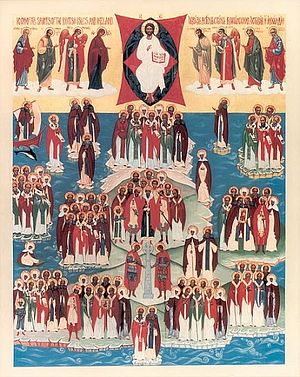 Icon of All Saints who shone forth in the lands of Britain and Ireland
Icon of All Saints who shone forth in the lands of Britain and Ireland
How unfortunate it is that the Orthodox Faith is often considered to be synonymous with Eastern Europe. To make this mistake is to ignore the fact that the Orthodox Faith has been confessed by so many outside Eastern Europe, from
Ireland to
India, from
Sweden to the Sudan. To overlook this and make Orthodoxy culturally exclusive is to conceal the real nature of this “mere Christianity” that is Orthodoxy; and that is to conceal the Faith of the Church in Heaven and of so many who still confess Orthodoxy on Earth. And such people there are, dwelling in all the Christian lands of the Earth. For in spite of our many attempts to overlay the Faith of the Church with the things of men, to hide it and distort it before human heart and human eye, the Faith of the Church, as established in Christ and by Christ, remains incorruptible. We may admit into the Church a false understanding of Christ, as in the Nestorian and Monophysite groups of the East, or we may admit a false understanding of the Holy Ghost, as in the Roman Catholic and Protestant groups of the West, but the Orthodox Faith remains. It is Christ's Faith, the work of the Holy Ghost through the Church and in man, which has been given the name of Orthodoxy. Is it not this Faith, and not that of Imperial Courts and State-Churches, nor that of Papal Courts and Church-States, nor yet that of those who rejected the Incarnation of the Church among humanity, is it not this Faith which is the Faith of the spiritually living, on Earth, as in Heaven? And it is to the Kingdom of Heaven that we must look if we seek the place of the ultimate fulfilment of this Faith. For only in the Kingdom of Christ do the nations find their inner selves, only there does the spiritual essence and identity of every Christian people stand in the glory of God, transfigured in holiness.
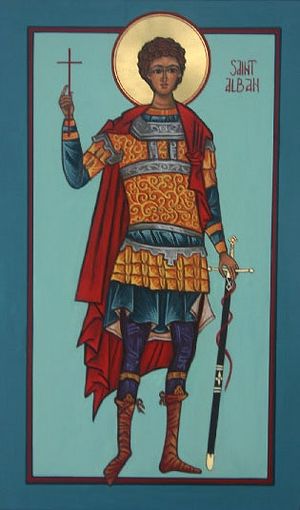 St. Alban - by Elizabeth Hudgins
St. Alban - by Elizabeth Hudgins
It is here that I wish to speak of England and her hallowed ones who stand in this Kingdom of Heaven and I would like to consider the significance of our land, one of the most ancient of Christian lands, in this light. For there stands in Paradise a holy company of Englishmen and Englishwomen, who in their earthly lives confessed a noble and a gentle faith, an English faith, which encompassed all that is finest and most beautiful, all that is spiritually fragrant in the heart of this people. There stands
St. Alban, who stood up for his faith and suffered martyrdom for his independence of spirit, who witnessed to the presence of God in this world and at once was filled with a great and holy gift, the grace to work miracles.
St. Oswald, a king on earth, who “toiling for the heavenly kingdom in continual prayer”, showed forth his heavenly kingship also, raising up a great cross to the honor of God and so overcoming the heathen at Heavenfield. Cuthbert, long famed as the Wonderworker of Britain, a man warm and beautiful in heart, who “served his Creator and saw Creation serving him”, and who struggled with the demons on his desolate island off the rugged, northern coasts and “sent forth his spirit to the bliss of Paradise”. Guthlac, another desert-father in spirit, who lived in the marshes and lonely fenlands of Lincolnshire, and fought a great war against that ancient foe of mankind, that Old Dragon, the Adversary, and who “spoke with the angels of the heavenly mysteries”, from whose mouth there came forth ”a fragrance like unto the scent of the sweetest flowers” and whose passing away was marked by the appearance of “a fiery tower, reaching from the earth to the height of heaven, turning the light of the sun itself to paleness”. Bede the Venerable, the writer of that history of the early spiritual moulding of England, a righteous and a learned man, “a candle burning with the Holy Ghost” at a time of darkness, whose soul “longed to see Christ his King, in His Beauty”. And that mild and blessed Bishop of Winchester, St. Swithin, the English rain-saint, who shone through his miracles, which came all from the Living God. And he of whom it is written: “The English land is not deprived of the Lord's saints, since in English earth lie such saints as this holy king”... “Edmund the blessed, King and Martyr, wise and honorable, ever glorified, amongst men as one of them”... “He was bountiful to the poor and to widows even like a father, and ruled over his people with goodwill, ever to righteousness”.
St. Edmund, the Royal Passion-Bearer, who, as Christ in the garden of Gethsemane, chose to suffer the anguish of death at the hands of non-believers rather than defend himself by the sword.
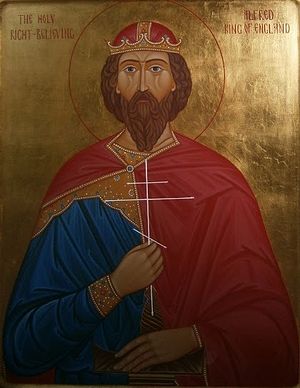 Alfred the Great
Alfred the Great
There also stands Alfred, who is called “the Great” and who became a legend among the English, “England's Darling”, famed for his wisdom and skill in all crafts, for not only did he save his land from the heathen, but also he greatly encouraged learning and monasticism at a time when they were all but dead. St. Dunstan, who came forth from that most ancient of England's holy places, Glastonbury, at a time of the nation's greatest need, to be the holy Archpastor of his people and the father of the spiritual flowering of England, of the homilist who wrote of “Christ the Golden-Blossom, Who liveth and reigneth with all holy souls”, and of those in Winchester who illuminated manuscripts with icons of an English beauty and grace, of an English homeliness, of which neither Rome nor Constantinople knew. Byrhtnoth, the ealdorman of Maldon, who in defeat spoke with the manliness of the English: “Thought shall be the harder, heart the keener, courage the greater, as our might lessens”. By Our Lord's side stands St. Mary, the Mother of God, who at this time shone forth in the Norfolk hamlet of Walsingham, holding a promise of the Heavenly Kingdom to all those who would remain faithful in the dark days ahead, a promise to protect the English land from the Evil One, a promise of consoling warmth and calm, which abides to this day ...
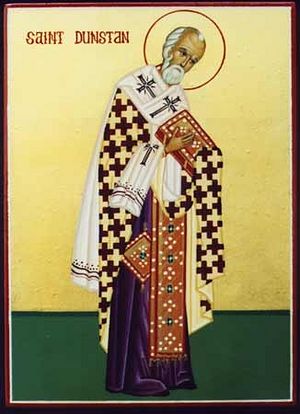 St. Dunstan
St. Dunstan
And then there came upon the land a dark time of feudal heaviness and oppression, the harmony and unity of the old culture were for ever lost and the nation divided into master and serf and the Church broken into clergy and laity. “And they built castles far and wide throughout the land, oppressing the unhappy people, and things went ever from bad to worse. When God wills, may the end be good”. Holiness left the affairs of the State and deserted the clerics and the educated, for they were no longer worthy, and it retreated into the inner heart of the nation, to the common people and to the monks, who alone had remained faithful to Christ. As the Norman barons spread Civil War, “men said openly that Christ and His saints slept”... “Evil reigned in the land”. The land groaned under the cruel yoke which men from over the sea had brought into the country, a yoke which was far worse than any before, since it affected the affairs of the Church as much as those of secular life. Salvation became more difficult, and the people fled away from the worldliness of “the Church” to the only source of salvation, to the mystical life which was best attained to in the eremitic state: “Only among the monks, where they lived virtuously, was righteousness to be found in this land”. The monks, the nuns, the hermits and lower clergy were drawn from the people, who lived a crushed and downtrodden life for the most part, such as may bring forth righteousness and the spirit of prayer which leads to the Kingdom of Heaven. The spirit of Old England was thus taken and made slave to the feudal lords and was forced to build castles “filled with devils and wicked men” and huge and gloomy church constructions for the glory of fallen man and his lust for power and earthly riches, whose spires longed heavenwards, towards the God that the people had known of old and now yearned for.
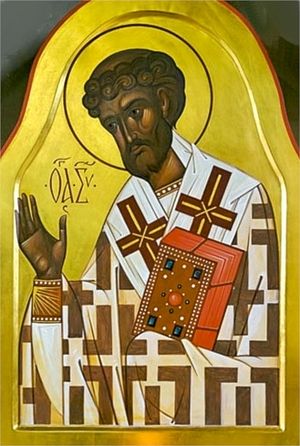 St. Swithin (Swithun) - by Sergei Fyodorov
St. Swithin (Swithun) - by Sergei Fyodorov
For some three centuries this oppression continued and the old spiritual traditions of the English were hidden and buried beneath the darkness and ugliness of the Middle Ages. Only when the imperial hegemony of Rome began to fall apart in the fourteenth century did the English start to live once more. Her masterbuilders created a new architecture, founded on the old lightness and delicacy, the former homeliness and warmth of the Old English churches; the love of the irregular and whimsical sprang forth afresh in wall paintings and carvings; the national spirit was celebrated in the tales of Robin Hood, of those who sought freedom from the oppressor in the greenwood; Chaucer wrote of those who wended their way to Canterbury “from every shire's end of England”; and, most of all, the prayers of countless men and women rose to heaven in the great mystical flowering of England, in Richard Rolle, in Mother Julian, in “The Cloud of Unknowing”, in a multitude of unknown anchorites and hermitesses, in a host of lay people, who toiled in spirit and suffered, as in William Langland and his vision of Piers Ploughman, the spiritual ploughman of England's broad and green acres, who, “on a morning in May, amongst the Malvern hills, tired by his wanderings and laying down to rest under a broad bank by the side of a stream, dreamt a marvellous dream ...” This dream was of Holy Church, the true spiritual vision of the Church which had been kept intact and whole in the bosom of the people, despite the false teachings which pervaded those times. “I will become a pilgrim, and walk to the ends of the earth in search of Piers Ploughman”, cried the voice of the people of the true Church of the English land. The longing for a pure faith was still in the heart of the poorest cottager, and it was to remain there for long.
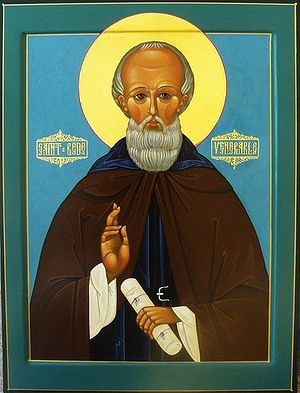 The Venerable Bede
The Venerable Bede
With the passing of the century, however, the spiritual voice of the people was to grow louder and the disaffection increased until it could no longer be contained. But the yoke which was removed in the Reformation would be replaced with a new one, that of the King; once more in their history, righteousness was to retreat into the heart of the people, into their love for the Bible, which was all that was salvaged from the ravages of the Medieval Church, together with that vision of Jerusalem, the Heavenly Church, which they strived to preserve in their spirit down all the ages, in the hope that it would lead them to salvation. It was this inner vision which the pious lived out in their daily lives and which inspired that great spirit amongst them, Shakespeare, who wrote at times of that vision and expressed in words the hopes of the people and the beauty that they cherished. It inspired also Thomas Traherne, who found “The Way to Blessedness”, it nourished those kindly and sincere men, George Herbert and Henry Vaughan, and fed the righteous of a whole nation. Again the yoke changed, the King deposed, and the yoke passed into the hands of the landowners and the growing class of businessmen; the spirit was greatly troubled and the people sorely oppressed; for them there was no worldly hope, their only hope lay in the promise of salvation, which they pursued in spite of the blasphemies around them, and as lovingly as the Holy Scriptures had been translated in the previous century. And when William Blake came to write of his vision of this green and pleasant land, of his vision of Jerusalem, it was with bitterness at those who strove to fabricate an earthen Paradise, an Empire without Faith, those who sought to destroy all that is finest and most beautiful in this land. It was left to the humble and blessed soul, John Clare, and later the lyric heart of the priest William Barnes, the peasant poets of England, to write of how this people was finally brought low and humiliated by the wealthy landowners and industrialists; that was an age of great sorrow and oppression, but also an age of righteousness, when a righteous man or woman, a mystic, was to be found in villages and hamlets up and down the land. It is the fragments of that great and precious heritage with which we are left today ...
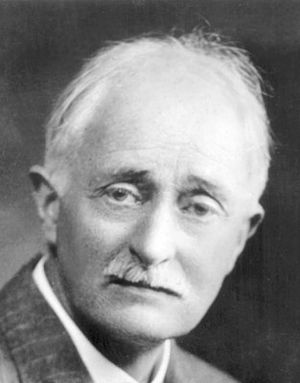 John Masefield (1878-1967)
John Masefield (1878-1967)
If the times are sorrowful on earth, then once more we must turn to that glorious host of English people, dwelling in the love of Christ, in the Kingdom of Heaven, and to him who stands at their head St. George - the Great-Martyr and Patron-Saint of England, but of him let the late Poet Laureate, John Masefield speak:
“So, I thought, that today is St. George's Day, and that today - in the far past, that great knight of God rode out, in the Eastern country, and killed a dragon which had been devouring women, and that Englishmen had thought that deed a holy, and most beautiful and manly thing, and had chosen St. George from among all saints to be their saint, and had taken his banner to be their banner, and called upon him, century after century, when they went into battle. For they felt that such a man lived on after death, and would surely help all holy and beautiful and manly men for ever and ever … The spirit of England is the something of the spirit of St. George, a manly and beautiful spirit, ready to help someone weaker, and something of the spirit of Shakespeare, a just and tender spirit, fond of fun and kindness and of the rough and busy life of men. That delicate, shy, gentle, humorous and most manly soul is the soul of England. It is in Chaucer, in Shakespeare, in Dickens. It is in the old ballads and tales of Robin Hood, who stood up for the poor, and was merry walking in the green forest. It is in the little villages of the land, in the old homes, in the churches, in countless old carvings, in old bridges, in old tunes, and in the old acts of the English, a shy, gentle, humorous and most manly soul, that stood up for the poor and cared for beauty. No finer thing can be said of men than that, that they stood up for the poor and cared for beauty; that they cared to be just and wise.”
And is it not this simple, hallowed England, this home of homes, this wooden-steepled land, rich in old beauty, oaken and straw-thatched, many in her woods and fields, fragrant with wild flowers, the homely smell of the earth in her old churches, her country - lanes that wind and twist and meadows of dill, apple-orchards and beehives, distant hamlets and broad. ploughlands, old inns and home-love, fresh rains in April and ripe barley in August, the swallows flying on mellow summer evenings, and the old, rambling gardens, redolent of English lavender and sweet-william, the England of the English saints, is it not this which is the true spirit of England?
But let that great Poet-Laureate of England speak once more - for he is more eloquent than I: “I know no land more full of bounty and beauty than this red land, so good for corn and hops and roses. I am glad to have lived in a country where nearly everyone lived on and by the land, singing as they carried the harvest home, and taking such pride in the horses, and in the great cattle, and in the cider trees. It will be a happy day for England when she realizes that those things and the men who care for them are the real wealth of a land: the beauty and the bounty of the Earth being the shadow of Heaven. Formerly, when men lived in the beauty and bounty of Earth, the reality of Heaven was very near; every brook and grove and hill was holy, and men out of their beauty and bounty built shrines so lovely that the spirits which inhabit heaven came down and dwelt in them and were companions to men and women, and men listened to divine speech. All up and down this County are those lovely shrines, all of the old time. I was born in this County, where there are so many of those shrines, the still living evidence that men can enter Paradise. I passed my childhood looking out on these red ploughlands and woodland and pasture and lovely brooks, knowing that Paradise is just behind them.”
Together with all the saints of the old times, the holy bishops and the kings and the martyrs, the holy abbesses and the humble cowherds, the hermits and the priests, it is these simple country people, those souls of the hidden heart of England, little-known and despised by the world, whose names we often do not even have, who fill this England which is in the Kingdom of Heaven, for they are the bearers of her true spirit, and the England which is their creation of beauty will not perish at the fulfilment of the times, for it is a Kingdom of the Spirit, and that which is hallowed by the Spirit is eternal and all that blessedness will stand with Christ.
O all the Saints of England, pray to God for us!
(Note: The quotations of John Masefield are taken from St. George and the Dragon and The Hereford Speech.)
From: Archpriest Andrew Phillips, Orthodox Christianity and the English Tradition.












